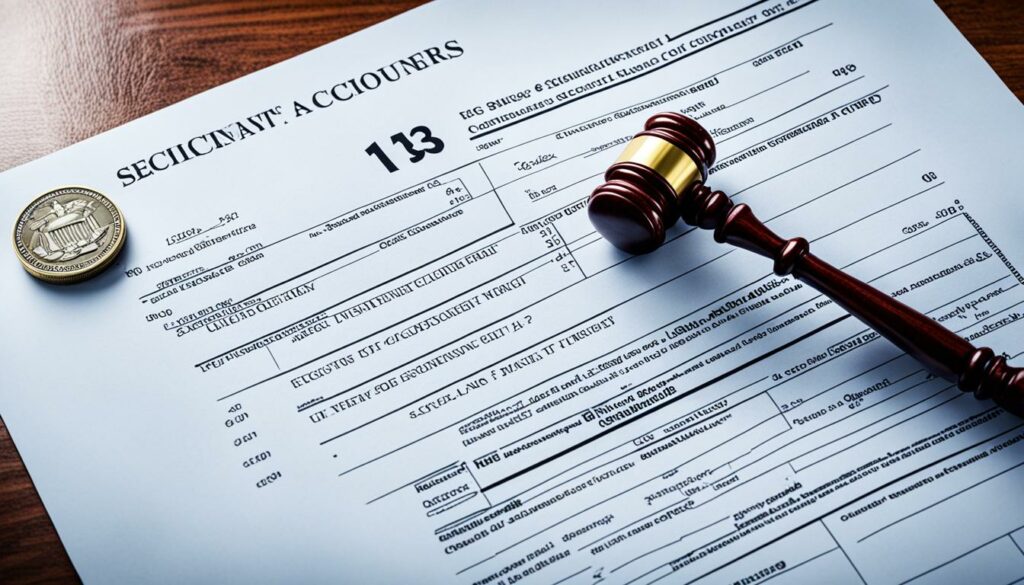The Supreme Court of India has made a big decision. It cleared up the law on unaccounted money under Section 138 of the Negotiable Instruments Act (NI Act). This decision is important for following the law and fighting financial crimes in the country.
It came from a case about a bounced check. Lower courts said the debt wasn’t valid because it wasn’t in the person’s tax returns. Now, a higher court looked into it. They asked if debts not shown in tax returns can still be legally enforced under the NI Act.
This decision could change a lot, especially in fighting tax evasion and money laundering. It tells us what to do with money not reported. It helps banks and police fight fraud and stop illegal money moves.
Background on Section 138 of the Negotiable Instruments Act
The Negotiable Instruments Act, 1881 (NI Act), is key in managing money matters and solving disputes over negotiable items like checks. Section 138 of this law deals with bounced checks. It helps creditors get back what they owe.
Presumptions regarding negotiable instruments under Section 118
Section 118 of the NI Act sets rules for negotiable items. It says every negotiable item was made for a reason. This means the law assumes it was given for a valid debt or promise, unless proven wrong.
Statutory presumption regarding holder of cheque under Section 139
Section 139 of the NI Act adds more rules for the holder of a bounced check. It says the holder got the check to pay off a debt or promise, unless proven otherwise. This rule is key in solving disputes over checks under the NI Act.
These rules from the Negotiable Instruments Act help in settling disputes over negotiable items. They make it easier for courts to handle cases and recover debts if all legal steps are followed.
Divergent Views Among High Court Judgments
Lower courts have different opinions on unaccounted transactions under Section 138 NI Act complaints. Some high court judgments say not having the transaction in income tax returns doesn’t stop enforcing the NI Act. But, other decisions argue that unaccounted money isn’t a “legally enforceable debt” under Section 138.
In one case, the Trial Court found the accused guilty and made them pay Rs.19,40,000/- in compensation. They also got a simple imprisonment for four months. But, the Appellate Court overturned the conviction and cleared the accused. They pointed out the complainant couldn’t prove the debt, there were cheque issues, and no documents were shown.
| Verdict | Key Details |
|---|---|
| Trial Court Conviction |
|
| Appellate Court Acquittal |
|
The conflicting rulings on unaccounted transactions under Section 138 NI Act show we need a clear Supreme Court decision. This would bring clarity to the matter.
“The success of the accused in cases under Section 138 of the Negotiable Instruments Act depends on their ability to rebut the statutory presumption outlined in Section 139.”
Reference to Division Bench on Legally Enforceable Debt
High court judgments were in conflict, so a division bench was asked to look into it. They had to decide if an unlisted transaction could be seen as a “legally enforceable debt”. This is important for using Section 138 of the Negotiable Instruments (NI) Act.
Framing of the Key Question on Unaccounted Transactions
The division bench looked at how Section 139 of the NI Act and the Income Tax Act deal with cash transactions. They wanted to know if not showing a transaction in tax returns stops the complainant from using Section 139.
They aimed to settle the disagreement and make it clear how unlisted transactions affect Section 138 complaints.
| Violation of Section 269-SS | Presumption of Legally Enforceable Debt |
|---|---|
| Violation of section 269-SS of the Income Tax Act, 1961 does not render a transaction unenforceable under Section 138 of the Negotiable Instruments Act. | The presumption under Section 139 of the Negotiable Instruments Act includes the presumption of a legally enforceable debt or liability. |
| Acceptance of an amount exceeding Rs. 20,000 in cash attracts a penalty under Section 271-D of the Income Tax Act, which can be waived upon showing reasonable cause. | The court observed there is a difference between failure to document a transaction in Income Tax and violation of Section 269-SS of the Income Tax Act. |
| The accused has the onus to rebut the presumption of a legally enforceable debt under Section 139 of the Negotiable Instruments Act with a strong defense. |
Arguments in Favor of Allowing Complaint Despite Unaccounted Money
The complainant’s lawyer said the rule in Section 139 of the Negotiable Instruments Act should apply. This rule says the holder of a bounced check got it to pay off a debt or liability. They pointed to Supreme Court cases that say the time limit only stops the lawsuit, not the right to the money.
Presumption of Legally Enforceable Debt under Section 139
Section 139 of the NI Act says the holder of a bounced check got it to pay off a debt or liability. This makes it easier for the complainant to start a case. They don’t have to prove there was a debt or liability to begin with.
Reliance on Supreme Court Judgments on Limitation and Debt Recovery
The lawyer said the Supreme Court has always said the time limit stops a lawsuit, not the right to the money. So, even if the money wasn’t accounted for, the rule in Section 139 still applies. This lets the complainant file a complaint under Section 138 of the NI Act.
The Supreme Court also said the NI Act is meant to quickly help get debts paid back. The courts should not make it harder to do this.

Arguments Against Allowing Complaint for Unaccounted Money
The accused’s lawyer said that a complaint under Section 138 of the Negotiable Instruments for an unaccounted transaction is wrong. They said it goes against the Income Tax Act, especially Section 269SS. This section stops taking more than a certain amount in cash.
They argued that the complainant can’t use an unaccounted money deal. This would hurt the rules of the income tax act to stop cash transactions and unaccounted money.
The defense said letting the complainant do this would be bad. It would make people use cash transaction limits and hide unaccounted money. This would go against the government’s goal to make finances clear and stop unaccounted money in the economy.
“Allowing a Section 138 complaint for an unaccounted transaction would undermine the income tax act provisions designed to curb the use of cash transactions and unaccounted money.”
The accused’s lawyer stressed keeping the income tax act honest. They don’t want to use Section 138 to make unaccounted money deals legal. They said courts should not let the complainant get away with an illegal act. This could lead to more law-breaking.
Division Bench’s Segregation of the Key Question
The division bench looked closely at the case. They saw the issue of not showing the transaction in income tax returns and breaking Section 269SS of the Income Tax as two different things. They split the key question into two parts for separate answers.
The first part was about if a legally enforceable debt exists under Section 139 of the Negotiable Instruments Act. The court wanted to know if the crime under Section 138 is mainly a civil wrong. It can be solved without the complainant’s okay if the accused pays them back.
The second part was about the issue of breaking the Income Tax Act rules on cash deals. The court saw this as a unique problem needing its own look. It was separate from the main question of what the offense under Section 138 is.
By splitting the key question, the division bench aimed for a deep look at the case’s many sides. This way, the court could look at the Section 138 offense and income tax issues separately. It led to a more detailed and thoughtful decision.
Statutory Provisions on Presumptions and Disclosures
The division bench looked at key laws, like Sections 118 and 139 of the Negotiable Instruments Act (NI). They also looked at the Income Tax Act, focusing on Section 269SS about cash transactions.
Relevance of Sections 118, 139 of the Negotiable Instruments Act
Section 118 of the NI Act talks about several presumptions. It includes the idea that a negotiable instrument has value and when it was made. Section 139 says that the person holding a cheque is seen as the real owner unless proven wrong.
Provisions under Income Tax Act on Cash Transactions
The Income Tax Act has rules, under Section 269SS, for big cash deals. These rules aim to make things clear and stop the use of hidden cash in money matters.
| Statutory Provision | Key Aspects |
|---|---|
| Section 118, NI Act | Establishes presumptions regarding negotiable instruments, including the presumption of consideration and the presumption of the date of the instrument. |
| Section 139, NI Act | Outlines a statutory presumption regarding the holder of a cheque, stating that the holder is deemed to be the rightful owner unless proven otherwise. |
| Section 269SS, Income Tax Act | Imposes restrictions on cash transactions exceeding a certain limit, promoting transparency and discouraging the use of unaccounted cash. |
The division bench’s look into these laws was key in understanding the legal issues around sections 118, 139 of the NI Act and cash transactions laws.
Unaccounted money 138 ni act supreme court
The Supreme Court has made a big ruling on unaccounted money under Section 138 of the Negotiable Instruments Act (NI Act). This ruling is big news for fighting black money, financial fraud, and the hidden economy in India. It will change how we deal with money and check disputes.
This ruling is very important for India, which is fighting against unaccounted money and needs more financial openness. The court looked at Section 138 of the NI Act, which talks about cheques that don’t have enough money. This could change a lot for businesses and people who deal with money.
The court said that Sections 118 and 139 of the NI Act are key in proving cases about cheques that bounced. If the accused can show enough evidence, they might win their case.
The Supreme Court stressed the need for strong evidence and who has to prove what in these cases. This could really help fight unaccounted money and financial fraud in India.
“The burden of proving guilt in criminal cases, especially related to Section 138 of the Act, rests with the prosecution, with the accused having the opportunity to rebut presumptions with evidence.”
This decision from the Supreme Court will help clear up confusion for lower courts, lawyers, and everyone else. It will give clear rules for dealing with unaccounted money and the Negotiable Instruments Act.

Examination of Supreme Court Precedents
A division bench looked into Supreme Court precedents. They looked at the Rangappa v. Sri Mohan decision. This decision partly changed the Krishna Janardhan Bhat v. Dattatraya G. Hegde judgment.
The Krishna Janardhan Bhat judgment was big news. It changed how the court looked at Section 139 of the Negotiable Instruments Act (NI Act).
Overruling of Krishna Janardhan Bhat Judgment
In the Krishna Janardhan Bhat case, the Supreme Court said a special rule couldn’t be used if the money wasn’t accounted for. But then, the Rangappa v. Sri Mohan case changed this. It said the special rule could be used even if the money wasn’t accounted for.
The court said the accused must show a strong reason to prove otherwise. This changed how courts looked at Section 138 of the NI Act.
The division bench found the Rangappa judgment important. It made the court look at Section 138 of the NI Act in a new way.
“The presumption under Section 139 of the Negotiable Instruments Act can be raised even in cases involving unaccounted money, subject to the accused providing a ‘preponderance of probabilities’ to rebut the presumption.”
Division Bench’s Observations and Ruling
The division bench looked closely at the laws and past Supreme Court cases. They made a ruling on if unaccounted transactions under Section 138 of the Negotiable Instruments Act (NI Act) are legal.
This ruling will help clear up confusion for future cases. It will guide courts on division bench rulings and if unaccounted transactions are legal.
The court focused on the main question. They looked at the NI Act, including Sections 118 and 139. These sections talk about negotiable instruments and who can hold a cheque.
- The court said the laws in these sections are very important. They help decide if a debt from a bounced cheque is legal.
- But, the court also looked at the Income Tax Act. It has rules about cash deals and what you must disclose.
After looking at past Supreme Court cases, the division bench made their ruling. They said the law doesn’t just look at the NI Act. It also looks at the Income Tax Act for unaccounted transactions.
“The division bench’s ruling provides much-needed clarity on the interplay between the NI Act and the Income Tax Act, guiding future courts in navigating the complex issues surrounding the legal enforceability of unaccounted transactions.”
This big decision will change how courts handle division bench rulings and unaccounted transactions under Section 138 of the NI Act.
Implications for Future Cases on Unaccounted Transactions
The Supreme Court’s ruling on unaccounted money transactions is big news for future cases. It will affect cases on financial fraud, tax evasion, and the hidden economy in India. The court’s clear words will help shape how check disputes are handled. This will make financial dealings more transparent and honest in the country.
The court said it’s key to follow the law in financial deals, no matter where the money comes from. This means people can’t just say they didn’t have the money to avoid legal trouble. Now, everyone in finance needs to keep better records and follow tax laws closely.
This decision also points out the need for a better way to deal with the hidden economy and unreported wealth in India. The court made it clear that a bounced check doesn’t always mean someone was trying to cheat. This helps separate real financial issues from hiding illegal money. It protects honest businesses and people while making sure everyone follows the financial rules.
